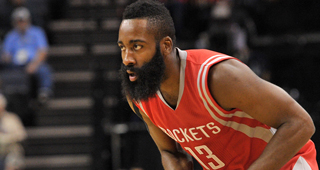James Harden’s agreement of a six-year, $228 million extension gives the Rockets a level of stability that doesn’t typically exist in an NBA where contract lengths have been reduced down to five years when a player hits free agency. Harden will be under contract with the Rockets through the 22-23 season, giving Houston six seasons of team control.
Harden agreed upon a four-year $118 million extension last summer and was grandfathered into the new CBA to add $169 million over four years to the deal, which is based on the NBA’s current $108 million cap projection.
For the Rockets, committing both years and dollars to Harden is an easy decision. Harden turns 28 this August and continues to improve while remaining one of the NBA’s most durable superstars. Harden has played 2,900 or more minutes in four of his five seasons with the Rockets while only having a minor ankle issue to limit his 13-14 to 2,777 minutes.
Harden had a career season in 16-17, averaging 28.9 points, 8.1 rebounds and 11.1 assists while thriving under Mike D’Antoni. Harden’s PER of 27.4 was a career high and he finished second in MVP voting for the second time in three seasons.
Harden has faded during multiple playoff runs as his regular season minute total and overall exertion on offense catches up with him. The Rockets’ trade for Chris Paul certainly helps increase their upside while also helping to alleviate that work rate and the need for him to play so many minutes.
With his combination of shooting, playmaking off the dribble, passing, and length on the wing, Harden almost certainly will remain a perennial MVP candidate during the vast majority of this contract.
Superstars are underpaid even at max contracts and despite his obvious shortcomings on defense, Harden is unquestionably one of the league’s true superstars as a player capable of both turning an average roster into a higher end playoff team and we’ll see this season how close he can get to the Warriors with an upgraded roster.
Grade for the Rockets: A
The Rockets have provided Harden the infrastructure of an imaginative general manager and a committed owner to avoid the dead ends that have plagued team and superstar combinations like Paul George and the Pacers, Dwight Howard with the Magic, Chris Paul and New Orleans/Clippers, LeBron James and the Cavs, Kevin Garnett with the Wolves, and countless others. This is why there is so much mutual faith.
The Rockets thought they were getting their duo of MVP candidates in 2013 in Harden and Dwight Howard, but that didn’t work and they pivoted to sign role players in Eric Gordon and Ryan Anderson while developing Clint Capela. Those moves led the Rockets to acquire another MVP candidate to pair with Harden in Chris Paul.
Houston doesn’t bottom out and they have constantly been able to maneuver multiple paths while remaining identifiably competitive, both before and since trading for Harden.
With that established track record, Harden gets to know he’ll be the focal point of any Houston team while remaining one of the NBA’s best paid players on a long-term contract that will take him to the age of 33 for his next free agency, which could very well have him remaining at a max level.
As much as the Rockets won the Harden trade in overwhelming fashion, Harden himself is the biggest winner. Harden signed a five-year, $80 million extension instead of settling for Oklahoma City's four-year, $55 million offer. Harden has since signed a 13-year, $200 million Adidas deal that he probably wouldn't have received if he was still the third guy with the Thunder, plus this $228 million in total money coming off that $80 million extension as he continues an unquestioned Hall of Fame career.
Grade for James Harden: A



